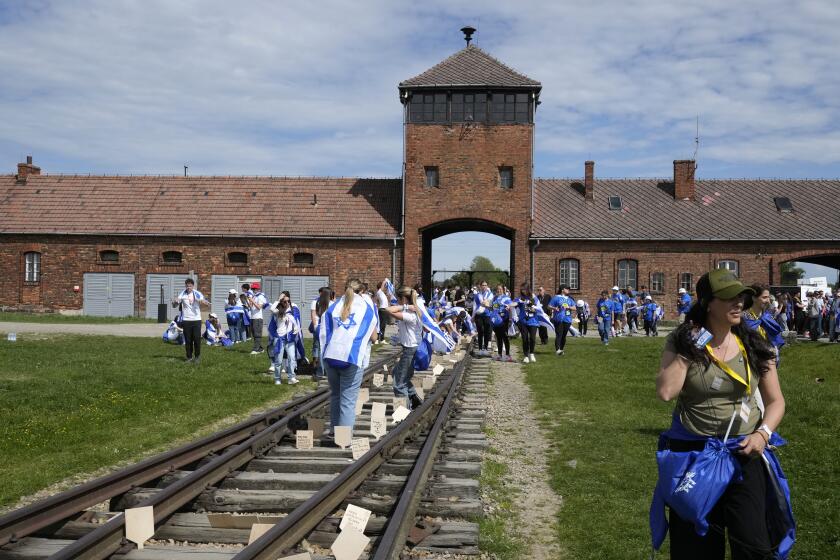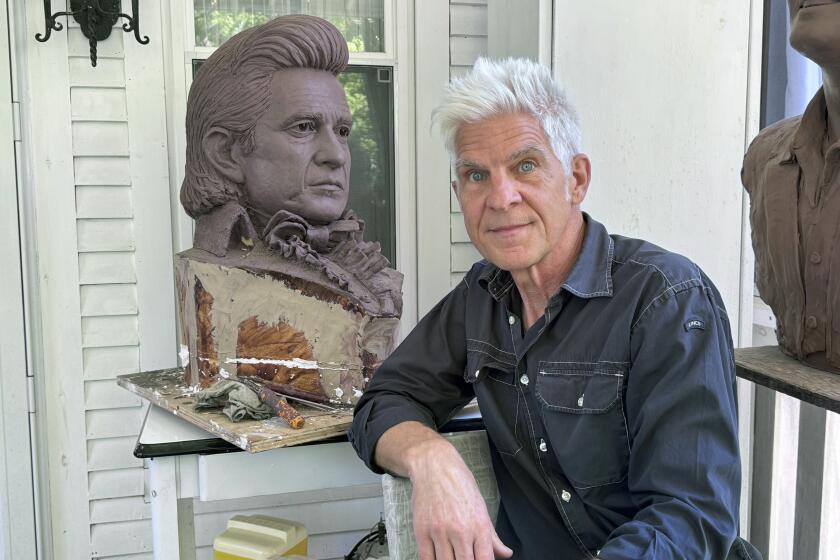Central America Deadline for Truce May Be Extended
The peace accord that won a Nobel prize for President Oscar Arias Sanchez is unlikely to achieve its goal of cease-fires by Nov. 5 in any of Central America’s three guerrilla wars, government and rebel officials say.
But the initial steps to comply with the Aug. 7 pact have created enough political momentum to carry the peace process well beyond the target date, according to Costa Rican officials and parties to the conflicts.
In recent days, a consensus has formed among signers of the five-nation agreement that the deadline, now two weeks away, is too soon for a final judgment to be made and should be extended to early next year.
The prospect of a drawn-out peace process is a problem for the Reagan Administration. Expecting the accord to fail on its own terms, the White House had announced plans to seek $270 million in new aid next month for the Nicaraguan rebels, who are running low on U.S.-supplied weapons.
The peace plan was drafted by Arias, and he and the presidents of El Salvador, Guatemala, Honduras and Nicaragua signed it at a meeting in Guatemala City. It set a 90-day deadline for cease-fires, a cut-off of outside aid to insurgent forces, amnesty for rebels who lay down their weapons, and full press and political freedoms for unarmed opposition groups.
So far, the agreement has led to a limited political opening but no peace talks in Nicaragua. Leftist guerrillas in El Salvador and Guatemala have opened negotiations with the governments they are trying to overthrow; but the talks have broken off in Guatemala and show no sign of an early truce in El Salvador.
Honduras has taken no apparent steps to expel the Nicaraguan Contras from sanctuaries in its territory, arguing privately that the Sandinista government’s refusal to negotiate with rebel leaders frees it from that obligation.
His prestige enhanced by the Nobel Peace Prize he won last week, Arias has been urging the other presidents to comply with the accord as soon as possible, while telling the world that they need more time.
‘Still Not Satisfied’
“We have advanced rapidly, far more than anybody hoped for before Aug. 7,” the Costa Rican leader said in an interview this week. “I am still not satisfied, but the calendar does not scare me.”
As the regional accord’s stated deadline approached, a commission of the five governments moved last weekend to clear up confusion over its precise date.
Some presidents have spoken of a deadline on Nov. 7, three full months after their summit in Guatemala City. The commission ruled that the actual date is Nov. 5, 90 days after the accord was signed, but Costa Rican officials say that the whole point has become almost meaningless.
“It doesn’t seem to me that on Nov. 6 we can say, ‘yes, there was full compliance,’ or ‘no, there was not’ and, if not, that the wars must continue and peace process must end,” Arias said.
Arias’ remarks put him at odds with President Reagan, who told the Organization of American States in Washington on Oct. 8 that the Sandinistas’ action on the accord “this next month will be crucial.”
New Request Planned
Predicting the Sandinistas will be short of full compliance, the Administration plans to ask Congress for $270 million in additional Contra aid before Thanksgiving.
Secretary of State George P. Shultz told the House Foreign Affairs Committee last week that early November was a legitimate deadline because “they (the Central Americans) set the date, we didn’t.”
But House Speaker Jim Wright, a Texas Democrat, has said that no new aid should be considered as long as the Central Americans are still working toward peace.
Two weeks ago, Arias first suggested a new deadline: Jan. 4, the date on which the five presidents are to meet here and review the accord’s effectiveness. In separate statements, the four other Central American leaders have supported that idea.
Presidents Jose Napoleon Duarte of El Salvador and Jose Azcona Hoyo of Honduras, the region’s closest U.S. allies, have met with Reagan at the White House in the past week and said that he should withhold military aid to the Contras at least until the January evaluation.
‘Disregard for Deadlines’
The Central Americans’ fading sense of urgency about their agreement seems to reflect, in part, what one Western non-U.S. diplomat calls “a cultural disregard for deadlines.”
“Reagan wants to push the view that a deadline is a deadline is a deadline, and five minutes later go after the Sandinistas with a big stick,” he said. “The Latin approach is to let things slide. They see Nov. 5 as just one point in a process. If that view can be carried in Washington, then Contra aid is in deep trouble.”
But Costa Rican officials and foreign diplomats say a movable deadline carries the risk of dooming the Arias initiative to the fate of the so-called Contadora peace negotiations that preceded it. Those talks, initiated in 1983 by Columbia, Mexico, Panama and Venezuela on the Panamanian resort island of Contadora, dragged on for four years without an agreement.
“The new element that could make this agreement work is Arias himself,” another diplomat said. “The peace prize has given him the moral authority to step in, denounce any of the parties for lack of good faith and muster support for sanctions. At what point he would do that and how subjective he would be, nobody knows.”
Salvadoran Conflict
As of now, the only peace talks under way in the region are aimed at ending El Salvador’s 7 1/2-year-old conflict. President Duarte met Oct. 4 and 5 with leaders of the Farabundo Marti National Liberation Front, a guerrilla organization, and its political ally, the Revolutionary Democratic Front.
The two sides formed two joint commissions, one to seek a negotiated cease-fire and the other to work for agreements on other provisions of a peace accord. But the cease-fire commission, which began meeting Wednesday in Caracas, Venezuela, was given until early December to finish its work.
Duarte said that if the commission was unable to reach an agreement by Nov. 5, he would declare a unilateral cease-fire to comply with the peace accord. But army officials and rebel leaders have indicated that fighting will continue until a truce is negotiated.
The negotiations so far have not softened the rebels’ demand for participation in a “transitional” coalition government or Duarte’s insistence that the rebels abandon violence and join the political process.
Some Hope Raised
But the talks, the first in three years, have changed the political climate in El Salvador and raised some hope in the long-term possibility of a peaceful settlement.
“It has redefined the agenda in the country,” said Ruben Zamora, an exiled leader of the Revolutionary Democratic Front who plans to return to El Salvador next month. “It has made peace and war the main issue and opened political space for us.”
The first formal peace talks in Guatemala’s 26-year-old guerrilla conflict were held Oct. 7-9 in Madrid between representatives of the Guatemalan government and a rebel coalition called the Guatemalan National Revolutionary Union. They reached no agreement beyond pledges to study each other’s proposals.
Last week, in Guatemala, Foreign Minister Alfonso Cabrera Hidalgo accused the guerrillas of breaking a promised truce during the talks and said that further meetings seemed pointless. That stance was backed by the army. But President Vinicio Cerezo Arevalo said he was “waiting for an opportunity” for talks to resume.
‘Secret Channel’ Told
A rebel spokesman, Gerardo Escalona, said in Vienna this week that the rebels were still speaking to Guatemalan officials through a “secret channel” but had received no reply to their demand for a political settlement that would reduce military influence over Cerezo’s civilian government.
Neither side has suggested that shooting in the low-level conflict, involving an estimated 2,000 guerrillas, is about to stop.
Like Duarte, Cerezo has insisted that the rebels lay down their arms and accept an amnesty. But promised amnesty laws in both countries are still being debated in the national legislatures.
In Nicaragua, the Sandinistas have allowed the only opposition newspaper to reopen, a Roman Catholic radio station to resume broadcasting, and given greater freedom to opposition parties. But they still rule under a state of emergency that formally limits political rights.
The Sandinistas have used an amnesty offer to try to persuade Contras to surrender but they have also said that the offer will not apply to all their estimated 9,000 political prisoners.
‘National Dialogue’
The government has declared unilateral cease-fires in four small war zones that it said may be expanded, and it has opened a “national dialogue” with unarmed opposition groups.
As limited as they are, these concessions are unprecedented in six years of war. The popular expectations unleashed by the accord are so great that the Sandinistas will find it costly to crack down again, according to opposition activists in Managua and Contra leaders in exile.
Ortega lent credence to that view recently when he pledged to “continue to work toward compliance” with the accord after Nov. 5, even if the United States keeps aiding the Contras.
But Ortega’s public refusal to talk to the rebel leaders, on the ground that they are puppets of the Reagan Administration, has brought criticism from the other Central American presidents.
In the interview, Arias said that Honduras could not be expected to throw the Contras out of his country until their future is clarified in cease-fire talks with the Sandinistas.
‘Hopeful Signs’
Arias said that he was in frequent telephone contact with Ortega and that the Nicaraguan leader has given “hopeful signs” of accepting his proposal for cease-fire talks mediated by Nicaraguan Cardinal Miguel Obando y Bravo.
“But time passes, and today time is our principal enemy,” Arias added. “If he is going to agree eventually, why not do it now? People are dying every day. That’s what has me a bit impatient.”
Arias said he is also insisting on “the broadest possible amnesty” in both Nicaragua and El Salvador and on greater press freedom than the Sandinistas have granted so far.
“I know it is not easy for Napoleon Duarte to deal with the pressures from the right and the left,” he said. “I know it is not easy for Daniel Ortega to convince the eight other (Sandinista) comandantes that this agreement is good for Managua.”
“But I hope that when we meet again in January, we will have advanced much farther. We would deceive our people if we keep stretching the calendar while the wars intensify.”
Times staff writers Marjorie Miller, in Managua, and Michael Wines, in Washington, contributed to this article.
More to Read
Start your day right
Sign up for Essential California for news, features and recommendations from the L.A. Times and beyond in your inbox six days a week.
You may occasionally receive promotional content from the Los Angeles Times.






